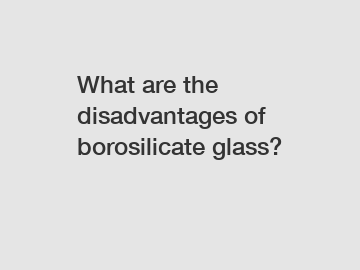What are the disadvantages of borosilicate glass?
When it comes to glassware, borosilicate glass is often hailed as the gold standard. It has a reputation for being incredibly durable, heat-resistant, and resistant to thermal shock. Borosilicate glass is commonly used in laboratory equipment, kitchenware, and even high-end glass art. However, despite its many advantages, borosilicate glass also has its fair share of disadvantages.
One of the main disadvantages of borosilicate glass is its susceptibility to scratching. While borosilicate glass is more resistant to scratches than regular glass, it is still prone to scratching when in contact with hard or abrasive materials. This can be especially problematic for glassware used in the kitchen, as utensils and cleaning materials can easily scratch the surface of the glass. Not only does this affect the aesthetics of the glassware, but it can also compromise its structural integrity over time.
Another disadvantage of borosilicate glass is its relatively high cost. Compared to regular glass, borosilicate glass is more expensive to produce due to the additional materials and manufacturing processes involved. This can make borosilicate glassware out of reach for some consumers, especially those on a tight budget. While the durability and heat-resistance of borosilicate glass may justify the higher cost for some, others may opt for more affordable alternatives.

In addition to its high cost, borosilicate glass is also more prone to breakage than regular glass. While borosilicate glass is known for its resistance to thermal shock – the rapid change in temperature that can cause glass to crack or shatter – it is still glass at the end of the day. Accidental drops or impacts can still result in breakage, which can be both costly and dangerous, especially when dealing with hot liquids or chemicals. This fragility can be a major drawback for those who need their glassware to withstand rough handling.
Furthermore, borosilicate glass is not completely immune to clouding or etching. While borosilicate glass is less prone to clouding and etching than regular glass, it can still occur under certain conditions. Hard water, harsh detergents, and acidic substances can all cause clouding or etching on the surface of borosilicate glassware, affecting its clarity and overall appearance. This can be particularly disappointing for those who invest in borosilicate glass for its aesthetic appeal.
Another disadvantage of borosilicate glass is its limited color options. Unlike regular glass, which can be easily tinted or colored, borosilicate glass is typically clear or slightly tinted. While this may not be a major concern for those who prefer the clean and minimalist look of clear glass, others may find the lack of color options limiting. This can be especially frustrating for artists or designers who want to create colorful and vibrant pieces using borosilicate glass.
Lastly, recycling borosilicate glass can be a challenge. Due to its unique chemical composition, borosilicate glass cannot be easily recycled with regular glass. This can make it difficult for consumers to dispose of their borosilicate glassware in an eco-friendly manner, as it may require special recycling facilities or processes. This can be a major downside for environmentally-conscious consumers who prioritize sustainability and recyclability in their purchasing decisions.
While borosilicate glass certainly has its fair share of disadvantages, it is important to remember that no material is perfect. Like any other material, borosilicate glass has its strengths and weaknesses that must be carefully considered before making a purchase. Whether you prioritize durability, heat-resistance, or aesthetics, it is essential to weigh the pros and cons of borosilicate glass to determine if it is the right choice for your needs. Ultimately, the decision to invest in borosilicate glass should be based on your individual preferences, requirements, and budget.
Want more information on neutral glass tube, Form B glass ampoule, borosilicate glass tube suppliers? Feel free to contact us.
244
0
0

Comments
All Comments (0)